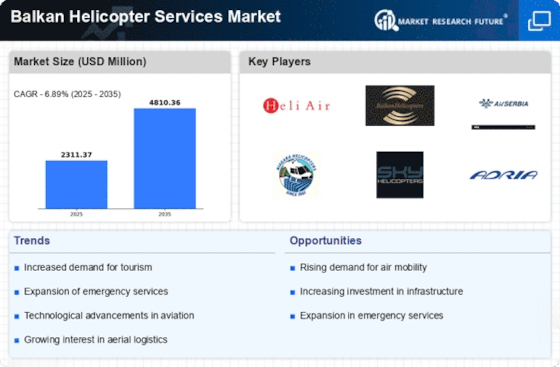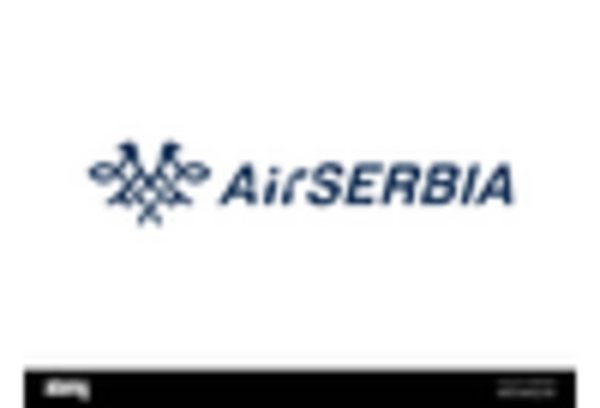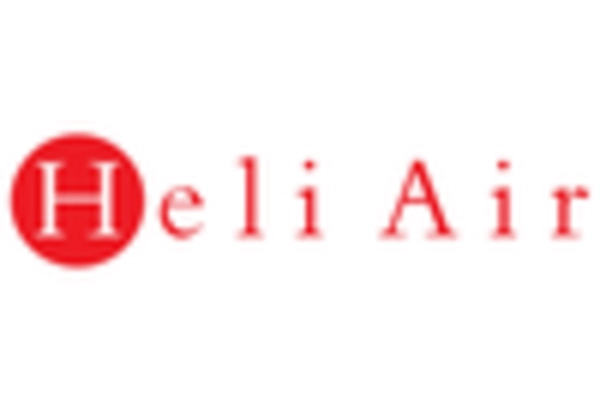Market Trends
Key Emerging Trends in the Balkan Helicopter Services Market
The Balkan helicopter services market has been experiencing significant developments and trends, driven by various factors including economic growth, increasing demand for aerial transportation, and advancements in helicopter technology. One notable trend in this market is the rising demand for helicopter services across the Balkan region due to its diverse geography, challenging terrain, and the need for efficient transportation solutions. Helicopters are playing an increasingly vital role in various sectors such as tourism, medical evacuation, search and rescue operations, aerial filming, and corporate travel. The flexibility, versatility, and accessibility of helicopters make them well-suited for addressing the transportation needs of both urban and remote areas in the Balkans.
Moreover, advancements in helicopter technology are shaping the Balkan helicopter services market, with the introduction of new aircraft models featuring enhanced performance, safety features, and operational capabilities. Modern helicopters equipped with advanced avionics, navigation systems, and automation technologies are improving flight efficiency, reliability, and safety, driving the adoption of helicopter services in the region. Additionally, the development of quieter and more fuel-efficient rotorcraft is making helicopter operations more environmentally friendly, aligning with sustainability goals and regulatory requirements in the Balkans.
Furthermore, the Balkan helicopter services market is witnessing increasing investment in infrastructure development and fleet expansion by helicopter operators and service providers. Companies are expanding their service offerings, fleet size, and geographic coverage to meet the growing demand for helicopter transportation services in the region. Helicopter operators are establishing strategic partnerships, alliances, and joint ventures to enhance their market presence, optimize operational efficiency, and diversify revenue streams. Additionally, investments in heliport infrastructure, maintenance facilities, and training centers are supporting the growth of the Balkan helicopter services market, enabling operators to offer a wide range of services and cater to various customer needs.
Another key trend in the Balkan helicopter services market is the integration of digitalization, data analytics, and connectivity to optimize fleet management, maintenance operations, and customer experiences. Helicopter operators are leveraging digital technologies such as IoT (Internet of Things), cloud computing, and predictive analytics to monitor aircraft health, track maintenance schedules, and predict potential issues before they occur. Additionally, digital platforms and mobile applications are being developed to streamline booking processes, enhance communication with customers, and provide real-time flight information, improving convenience and transparency for passengers.
However, despite the opportunities and advancements in the Balkan helicopter services market, several challenges remain, including regulatory complexities, infrastructure constraints, and economic uncertainties. Regulatory frameworks governing helicopter operations vary across Balkan countries, posing challenges for operators seeking to navigate compliance requirements and obtain necessary permits and approvals. Additionally, infrastructure limitations such as the availability of suitable heliport facilities, navigation aids, and maintenance support services can impact the scalability and accessibility of helicopter services in the region. Economic factors such as fluctuating fuel prices, currency exchange rates, and geopolitical tensions may also affect the demand for helicopter services and investment decisions in the Balkans.


















Leave a Comment